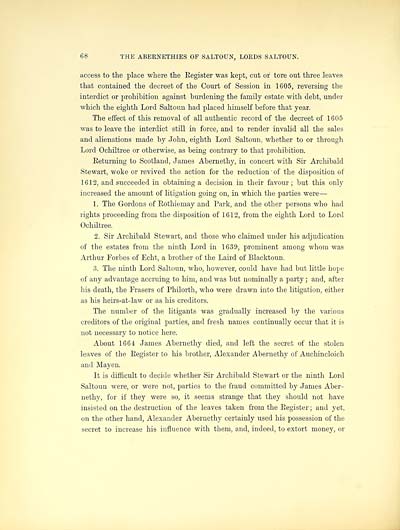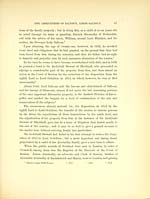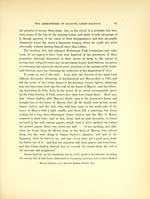Frasers of Philorth > Volume 2
(82)
Download files
Complete book:
Individual page:
Thumbnail gallery: Grid view | List view

68 THE ABERNETHIES OF SALTOUN, LORDS SALTOUN.
access to the place where the Eegister was kept, cut of tore out three leaves
that contained the decreet of the Court of Session in 1605, reversing the
interdict or prohibition against burdening the family estate with debt, under
which the eighth Lord Saltoun had placed himself before that year.
The effect of this removal of all authentic record of the decreet of 1605
was to leave the interdict still in force, and to render invalid all the sales
and alienations made by John, eighth Lord Saltoun, whether to or through
Lord Ochiltree or otherwise, as being contrary to that prohibition.
Eeturning to Scotland, James Abernethy, in concert with Sir Archibald
Stewart, woke or revived the action for the reduction ' of the disposition of
1612, and succeeded in obtaining a decision in their favour ; but this only
increased the amount of litigation going on, in which the parties were —
1. The Gordons of Eothiemay and Park, and the other persons who had
rights proceeding from the disposition of 1612, from the eighth Lord to Lord
Ochiltree.
2. Sir Archibald Stewart, and those who claimed under his adjudication
of the estates from the ninth Lord in 1639, prominent among whom was
Arthur Forbes of Echt, a brother of the Laird of Blacktoun.
3. The ninth Lord Saltoun, who, however, could have had but little hope
of any advantage accruing to him, and was but nominally a party ; and, after
his death, the Erasers of Philorth, who were drawn into the litigation, either
as his heirs-at-law or as his creditors.
The number of the litigants was gradually increased by the various
creditors of the original parties, and fresh names continually occur that it is
not necessary to notice here.
About 1664 James Abernethy died, and left the secret of the stolen
leaves of the Eegister to his brother, Alexander Abernethy of Auchincloich
and Mayen.
It is difficult to decide whether Sir Archibald Stewart or the ninth Lord
Saltoun were, or were not, parties to the fraud committed by James Aber-
nethy, for if they were so, it seems strange that they should not have
insisted on the destruction of the leaves taken from the Eegister ; and yet,
on the other hand, Alexander Abernethy certainly used his possession of the
secret to increase his influence with them, and, indeed, to extort money, or
access to the place where the Eegister was kept, cut of tore out three leaves
that contained the decreet of the Court of Session in 1605, reversing the
interdict or prohibition against burdening the family estate with debt, under
which the eighth Lord Saltoun had placed himself before that year.
The effect of this removal of all authentic record of the decreet of 1605
was to leave the interdict still in force, and to render invalid all the sales
and alienations made by John, eighth Lord Saltoun, whether to or through
Lord Ochiltree or otherwise, as being contrary to that prohibition.
Eeturning to Scotland, James Abernethy, in concert with Sir Archibald
Stewart, woke or revived the action for the reduction ' of the disposition of
1612, and succeeded in obtaining a decision in their favour ; but this only
increased the amount of litigation going on, in which the parties were —
1. The Gordons of Eothiemay and Park, and the other persons who had
rights proceeding from the disposition of 1612, from the eighth Lord to Lord
Ochiltree.
2. Sir Archibald Stewart, and those who claimed under his adjudication
of the estates from the ninth Lord in 1639, prominent among whom was
Arthur Forbes of Echt, a brother of the Laird of Blacktoun.
3. The ninth Lord Saltoun, who, however, could have had but little hope
of any advantage accruing to him, and was but nominally a party ; and, after
his death, the Erasers of Philorth, who were drawn into the litigation, either
as his heirs-at-law or as his creditors.
The number of the litigants was gradually increased by the various
creditors of the original parties, and fresh names continually occur that it is
not necessary to notice here.
About 1664 James Abernethy died, and left the secret of the stolen
leaves of the Eegister to his brother, Alexander Abernethy of Auchincloich
and Mayen.
It is difficult to decide whether Sir Archibald Stewart or the ninth Lord
Saltoun were, or were not, parties to the fraud committed by James Aber-
nethy, for if they were so, it seems strange that they should not have
insisted on the destruction of the leaves taken from the Eegister ; and yet,
on the other hand, Alexander Abernethy certainly used his possession of the
secret to increase his influence with them, and, indeed, to extort money, or
Set display mode to:
![]() Universal Viewer |
Universal Viewer | ![]() Mirador |
Large image | Transcription
Mirador |
Large image | Transcription
Images and transcriptions on this page, including medium image downloads, may be used under the Creative Commons Attribution 4.0 International Licence unless otherwise stated. ![]()
| Histories of Scottish families > Frasers of Philorth > Volume 2 > (82) |
|---|
| Permanent URL | https://digital.nls.uk/96571240 |
|---|
| Attribution and copyright: |
|
|---|---|
| Description | A selection of almost 400 printed items relating to the history of Scottish families, mostly dating from the 19th and early 20th centuries. Includes memoirs, genealogies and clan histories, with a few produced by emigrant families. The earliest family history goes back to AD 916. |
|---|

